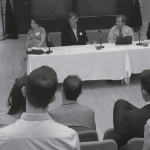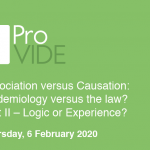Association versus causation: epidemiology versus the law? Part II

Pro-Vide Law will be hosting a follow up event to the Seminar at Wadham College Oxford on 11th July.
The seminar in July was well received by those who attended.
A quite excellent seminar today at Wadham College, Oxford, on Epidemiology and causation with some seriously impressive speakers. Thank you.
The speakers were all hugely impressive and the organisation was perfect. The topic was stimulating and I have no doubt that there will be significant developments in the case law in this area in the near future.
For photographs of the event please click here.
The next event is on 6th February 2020 and will be hosted by DWF at its London Office at 20 Fenchurch Street. We are grateful to DWF for hosting the event. There will no charge for attendance.
The success of the Oxford Seminar was largely the result of a combination of authoritative speakers and a well-informed audience. Discussion was not just limited to the lecture theatre. Expertly chaired by Jeremy Stuart-Smith, the programme enabled the questions to be addressed from several perspectives including what gets into the medical literature and why, the complex nature of epidemiological evidence, what questions it is addressing and what answers it is providing, and most important of all, how relevant are those answers in the context of proof of causation in the law or tort?
The discussions provided confirmation, if needed, that the supposed “doubles the risk” had no support as a simplistic test of causation. As pointed out by Baroness Hale in Sienkiewicz, assessing risk prospectively in this way informs a decision as to whether to embark upon a certain cause of action. Even on this background there is no reliance on a “doubles the risk” test. As Roy Jenkins famously said, if there is a 10% chance of rain, you would probably still go on a picnic, but if there was a 10% chance of there being a bomb on a plane, you would not get on the plane.
More relevantly once a risk has eventuated, a prospective assessment of that risk is at best a background consideration. The risk is now 100% and knowing that it was at a much lower level assessed prospectively does not immediately appear to have any great relevance. Clearly, if it is shown that the specific risk factor under consideration more than doubled the risk of the event occurring, this is a persuasive starting point for the proposition that the event occurred because of this risk. However, it is not conclusive. There may be in fact other more significant risks including biophysiological reasons to think that the relevant risk was not in fact the cause.
Further, arguably showing that the relative risk was less than 2 should not of itself be considered fatal to the claim of an individual claimant. The claimant may be able to demonstrate that the tortious elevated risk was the only one known to be present. In these circumstances, it may be instructive to consider the extent to which other risks have been excluded in the case of a claimant, which would not have been done with the same rigour in relation to the control group in the relevant study. In the forensic context, great time and care is taken to investigate other risk factors, whereas in any epidemiological study this may only have been by way of a questionnaire. Further, the claimant may be able to demonstrate strong biophysiological plausibility associated with the relevant risk factor, even though the epidemiological evidence would suggest that viewed prospectively the RR was less than 2.
These issues clearly require further discussion. Whilst it will clearly not be possible to achieve an approach with the beguiling simplicity of the “doubles the risk” test, some degree of consensus as to how epidemiological evidence should be applied is clearly necessary.
The follow-up event intends to look in more detail at the practical application of epidemiological evidence. We are pleased that Professor Maurice Zeegers of the University of Maastricht will be speaking. Maurice is one of the first Professor of Forensic Epidemiology and will explain this specialty. It is intended to look at specific case studies to identify the issues and a practical approach to them. Suggestions will be gratefully received.
To register an interest in attending this event please email editors@pro-vide-law.co.uk.


